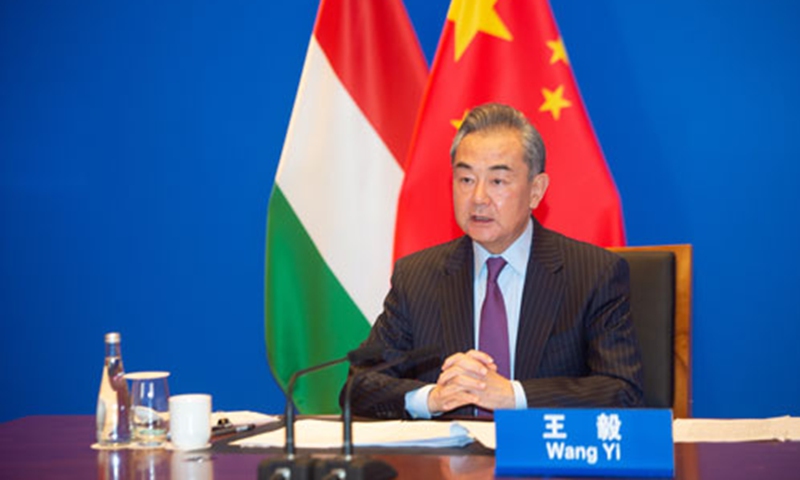China hails productive relations with Hungary, ‘warns potential followers of anti-China Lithuania’

China's State Councilor and Foreign Minister Wang Yi. Photo: Chinese Foreign Ministry
China's State Councilor and Foreign Minister Wang Yi slammed the US-led "Summit for Democracy" as anti-democratic behavior under the banner of democracy and reiterated China's stance on Lithuanian provocations over the island of Taiwan during his virtual meeting with Hungarian Minister of Foreign Affairs and Trade Peter Szijjarto on Thursday.
China and Hungary have cooperation traditions and maintain smooth and positive high-level interactions, yielding productive results, observers said on Friday.
As Lithuania is trying to influence Baltic and more European countries toward provoking China in the name of democracy, it is important to make clear China's stance and warn a few potential Hungarians and other regional politicians who want to follow suit to gain political capital. The big picture of bilateral relations should not be affected by some short-sighted figures, they said.
Wang reiterated China's stance on the so-called summit, and said democracy is the right of people of all countries, not for only a few countries. Democracy is not a test sheet made by the US for other countries to answer.
The US invited people from the island of Taiwan to attend the "summit for democracy" while Hungary, which has maintained good relations with China and Russia, was the only EU member excluded from the event.
Sun Keqin, a research fellow at the China Institutes of Contemporary International Relations, told the Global Times on Friday that from the "guests" of the so-called summit, it is obviously an anti-China gathering, an event to form a clique and create divergence when what the world needs is "solidarity" and "cooperation," Wang said.
Despite friendly China-Hungary relations, there are anti-China noises in the country. The mayor of Budapest, Gergely Karacsony, in June announced a plan to rename some city streets, using provocative names like "Dalai Lama Street" and "Free Hong Kong Road."
Wang's remarks not only aim to dispel potential noises from a few anti-China figures in Hungary, but also serve as a warning to other countries where anti-China forces are trying to stir up trouble in this round of the US-manipulated, Lithuania-led provocations, Sun said.
Some 10 parliamentarians from Lithuania, Estonia and Latvia plan to visit Taipei in early December and meet with Taiwan's "top officials." The Baltic is leaning to the US more than other regions, and what Lithuania is doing may prompt some followers in the region, especially among the opposition, given the nature of party politics, observers said.
But they pointed out that the US has proven repeatedly it is not a reliable ally or partner in international affairs. Those who want to follow Lithuania for short-term rewards should get prepared to be abandoned by Washington, while repairing ruined relations then won't be easy.
China and Hungary have always respected, trusted and helped each other, creating a model of mutual benefit and win-win results between countries with different systems. Wang told Szijjarto that China firmly supports Hungary in defending its independence, sovereignty and dignity.
Szijjarto said Hungary upholds the one-China policy, respects China's sovereignty and territorial integrity, and supports China's just stance.
Wang and Szijjarto hailed the construction of the Hungary-Serbia rail link, which is part of the China-proposed Belt and Road Initiative.
Szijjarto welcomed Chinese firms to expand investment in Hungary, stressed Chinese vaccines' key role in the country's fight against COVID-19, and expressed enthusiasm for the 2022 Beijing Olympic Winter Games, opposing interrupting sports with ideology and politics.
China and Hungary have set an example of not allowing potential negative elements to affect the big picture of bilateral relations, which requires far-sightedness and wisdom on both sides. Diplomatic relations shouldn't be hijacked by individual politicians, which is the same for China's relations with Central and Eastern Europe Countries (CEEC), which should not be hijacked by one radical country, Sun said.
Wang's remarks will better communicate to the CEEC in such an occasion - a bilateral dialogue with a regional country that has a friendly tradition with China, the expert said.
China and CEEC have a solid foundation for cooperation, which can withhold noises and bring about real benefits for both sides, Sun said, noting Hungary has been playing a key role in building a benign China-CEEC relationship.
Wang and Szijjarto exchanged views on relations between China and Europe. Wang said China and Europe are partners, not rivals, and that the areas of consensus between the two sides far exceed differences. He appreciated Hungary's rational and practical attitude on the topic, which is also in the interest of the EU as a bloc and European countries.
Szijjarto said Hungary firmly supports the development of Europe-China relations and will continue to play an active role in the cooperation between CEEC and China.

